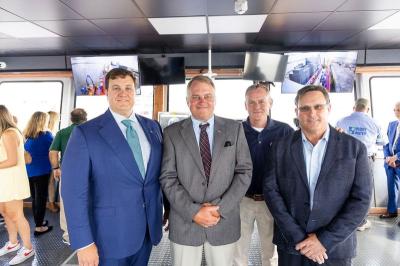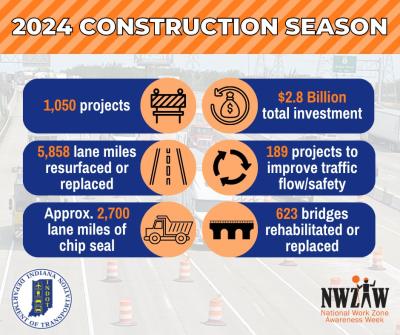For a company that’s not sales- or volume-driven, Belair Excavating has shown growth since its founding in the late 1940s.
“We want to be driven by serving the needs in our industry, as opposed to trying to meet sales quotas or volumes,” said Belair Excavating CEO Mark Murlowski. “Our mission is to serve the needs of our stakeholders, which include customers, employees, subcontractors, vendors, shareholders and others.
“You’ll notice that statement doesn’t include the word ’profit.’ Of course, we have to earn a profit in order to have lifeblood in our business. But if our ultimate mission is to serve the needs of those affected by what we do, profit will follow. The core management team, whether they have the Murlowski name or not, takes pride in our name and our company. Our priorities are God, family and business, in that order,” he added.
That philosophy has proven effective for Belair Excavating. When Henry A. Murlowski, Mark’s father, founded the company after World War II, he began by building affordable houses in Minnesota’s Twin Cities.
In the 1960s, the company added commercial and apartment construction to its capabilities. By then, the small crew had grown to include several hundred employees.
Today, Belair Excavating has 350 employees in four locations with four major construction competencies.
The St. Charles, IL, location focuses on earthwork in Illinois, while the Denver, CO, and Naples, FL, groups do mostly utility and earthwork. The crews based in Belair’s corporate headquarters in New Brighton, MN, handle environmental remediation and demolition in addition to the other two specialties.
Strong Family Involvement
With three generations now active in the company, the Murlowski family has remained deeply involved in the family business. Mark Murlowski is CEO, while his brother Michael serves as COO. Mark’s daughter, Gina, is vice president and general counsel for Belair and also acts as general manager of the St. Charles office. Mike’s daughter, Jennifer, is an earthwork project manager in Naples.
Other key management personnel include CFO Tracy Dabrowski, Corporate President Philip Paquette, Senior Vice President John Stenglein, Vice President Joseph Buche and Regional Vice Presidents Timothy Burkhart and William “Dutch” Van Rossum.
According to the company, its mission to serve stakeholders needs has customers coming back time and again to Belair, with business from repeat customers representing nearly 75 percent of its work.
Recent expansions into other states from the Minnesota base are largely a result of following customers’ work to other regions. About 85 percent of the company’s work is negotiated contracts for private parties with the remaining 15 percent public work.
Diversity Fuels Growth
In addition to expanding geographically, adding specialties to Belair’s construction competencies has fueled the company’s growth. Some of Belair’s current projects in Illinois are examples of that specialized diversity.
Van Rossum, who works out of the St. Charles office, said the company has three large projects in the Chicagoland area.
“We’re working on the Southwest Quadrant project, and we recently started Orland Park, also in the south,” he said. “We just finished up at Alsip, which is an 80-acre site for three commercial buildings.”
The Alsip project involved everything from stripping and exporting the topsoil, to building excavation, backfill and stone for the building pads.
“That’s typical of the scope of our work,” Van Rossum noted.
Currently underway, Belair Excavating crews are moving about a half million yards of dirt at the Orland Park project. The 85-acre site will be a retail center, slated to open in about a year.
The third large project, on the Southwest Quadrant of I-55 and Weber Road, poses some interesting challenges for Belair crews.
“Much of the 200-acre site is in the flood plain,” Van Rossum said. “In order to develop the site, we have to enhance about 60 to 70 acres of existing wetlands. The remaining acres will be developed into industrial and commercial projects with buildings ranging from half a million to one million square feet.”
Belair crews are currently doing the mass grading and site preparation for phase one.
“We’re getting rid of the unsuitable material and bringing in structural material to build up the pads,” he said. “We’re moving and stockpiling about a half million yards of topsoil plus moving about 1.5 million yards of clay at the site. There are also 300,000 yards of import and 300,000 yards of export topsoil and peat.”
Van Rossum added that the company hopes to remain on the project to complete the building pads as well.
The wetlands improvement involves removing cattails, which are not beneficial, and putting in new plantings that will enhance the quality of the wildlife population.
“We’re working with the Army Corps of Engineers, the IEPA, Will County and the Village of Romeoville. Everybody’s involved to make sure it’s done correctly,” Van Rossum said.
Jobs Demand Tough Equipment
Moving massive amounts of dirt and digging precise excavations all on tight deadlines require equipment that’s productive and durable, as well as versatile.
That’s why Belair Excavating turns to McAllister Equipment Co. and Sales Representative Mike McNamara to meet many of its equipment needs.
Belair’s St. Charles location currently has a fleet that includes nine Volvo A40D articulated haul trucks, three excavators (two EC460BLCs and an EC360BLC), two motorgraders (a G720B and a G730B), plus a L50 wheel loader.
Van Rossum said the Volvo trucks are ideal for the work in the wetlands at the Southwest Quadrant project.
“That’s where the Volvo trucks shine. It’s all soft peat in there and we’re able to get in there with the A40D trucks. We haven’t had any downtime either. Nothing else outshines the Volvos in speed, operator friendliness and cab comfort,” he said. “We’ve done competitive trials with the trucks, and time and time again, the operators want to run Volvos.”
General Superintendent Tony Geach concurred and noted the Volvos fuel efficiency.
“They take less fuel and they run better. They’re better in rough or soft terrain too,” he added.
According to Van Rossum, Belair crews are also happy with the Volvo excavators.
“We’re using them to load the A40D trucks on the Southwest Quadrant project. They’re digging clay and gravel out of ponds and digging peat from the wetlands. We’re getting good production from them and great cycle times,” he said.
The motorgraders are maintaining the haul road at the project to help minimize cycle times for the off-road trucks. Belair operators are also using them for final grading on the building pads and for subgrading the topsoil.
Van Rossum explained that Belair originally turned to McAllister Equipment because the company’s Minnesota headquarters had such a good relationship with its local Volvo dealer.
“We know how important dealer support is,” he said. “We’ve only had a couple small issues here with the Volvo equipment but McAllister stepped right up to the plate and came through. That’s strengthened the relationship because it’s a team effort. They treat us the way we treat our customers. If something’s not right, they take care of it.”
Although Belair has two mechanics working out of the St. Charles location, they let McAllister handle much of the maintenance and repair work. The short service intervals on Volvos also help the company cut maintenance time.
“We’re picking up a half hour of production a day because the machines only require greasing every 150 hours instead of daily,” said Van Rossum.
He also said it’s important to keep equipment up to date. “When machines reach a certain hour level, we trade them off. We have to make sure our equipment’s running to make us money, so we keep late models in our fleet.”
At Belair, taking care of employees is even more important than equipment care.
“Our number-one asset is our people and taking care of them is a priority. We’ve won national awards for our safety program and we’re very safety conscious on the jobsites,” Van Rossum added.
Tom Ludwig is in charge of safety compliance; Pete Sargent is Belair’s national safety director.
Solid future
With a solid history of growth, third-generation family member Gina Murlowski reflected on the past and predicted an equally bright forecast for the coming years.
“We all take a lot of pride in the family name and in the company,” she said. “I credit much of our success to the leadership of my dad Mark and uncle Michael. We have values in the company that relate to faith and family and it provides a really good atmosphere for our employees. We give employees the tools they need to move up within the company and grow.
“I see controlled growth in the future. Belair doesn’t want to be the biggest but we want to be the best. We’ll grow only if we can maintain the standards of service we’re used to giving our customers,” she concluded.
(This article appears courtesy of McAllister Equipment News.)
Today's top stories














